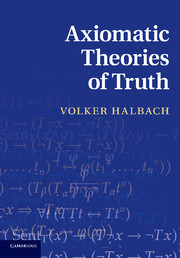Book contents
- Frontmatter
- Contents
- Preface
- Part I Foundations
- 1 Definitional and axiomatic theories of truth
- 2 Objects of truth
- 3 Tarski
- 4 Truth and set theory
- 5 Technical preliminaries
- 6 Comparing axiomatic theories of truth
- Part II Typed truth
- Part III Type-free truth
- Part IV Ways to the truth
- Index of systems
- Bibliography
- Index
5 - Technical preliminaries
- Frontmatter
- Contents
- Preface
- Part I Foundations
- 1 Definitional and axiomatic theories of truth
- 2 Objects of truth
- 3 Tarski
- 4 Truth and set theory
- 5 Technical preliminaries
- 6 Comparing axiomatic theories of truth
- Part II Typed truth
- Part III Type-free truth
- Part IV Ways to the truth
- Index of systems
- Bibliography
- Index
Summary
Before delving into the formal details and logical analysis of axiomatic truth theories, I would have preferred to discuss further philosophical issues and the motivations for the technical development. But without being able to refer to the logical machinery, I find it hard to do so. Hence I will now tackle the formal part of my project and postpone the treatment of the philosophical issues until the last part.
Peano arithmetic
In discussing axiomatic systems, I will occasionally distinguish between formal systems and theories.
A formal system is a collection of axioms and rules for generating theorems. Almost all the systems I am going to discuss are formulated in classical logic. In most cases it does not matter exactly which logical calculus is used. In some cases, however, it will be necessary to specify the exact logical rules, and in these cases I will use a sequent calculus, as described in many standard textbooks (Troelstra and Schwichtenberg 2000, for instance).
A theory is a set of formulae closed under first-order logical consequence. Thus a theory may be generated by many different formal systems. However, in many cases, when the difference does not matter, I will not clearly distinguish between theories and the systems that generate them.
- Type
- Chapter
- Information
- Axiomatic Theories of Truth , pp. 29 - 38Publisher: Cambridge University PressPrint publication year: 2011



